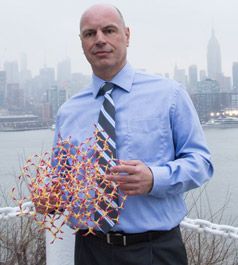Researchers from Lehigh University and the Stevens Institute of Technology have announced a major advance in the fundamental understanding of a catalytic reaction that directly converts natural gas into valuable liquid fuels and feedstocks for the chemical industry.
In an article published in Science magazine on April 9, the researchers reported a molecular-level understanding of the critical reaction, which employs catalysts with molybdenum nanostructures supported on shape-selective zeolites. They identified the initial molybdenum nanostructures and their anchoring sites on the zeolite supports by combining state-of-the-art spectroscopy techniques, reaction rate measurements and quantum-chemical calculations.
In addition, the researchers demonstrated that the initial molybdenum nanostructures can be regenerated after catalyst deactivation, fully restoring catalytic activity. They also showed that the distribution of the molybdenum nanostructures can be controlled, which can lead to enhancements in catalytic activity. The three-year project was funded by the National Science Foundation.
Their achievement, the researchers wrote, “opens new opportunities for the rational design of improved catalyst formulations and for optimizing the reaction conditions” for the conversion of natural gas.
The Science article, titled “Identification and Regeneration of Molybdenum Oxide Nanostructures on Zeolites for Catalytic Conversion of Natural Gas to Liquids,” was coauthored by Jie Gao, Yiteng Zheng and Simon Podkolzin of Stevens Institute and Jih-Mirn Jehng, Yadan Tang and Israel E. Wachs of Lehigh.
Gao and Zheng are graduate students in Prof. Podkolzin’s group in the department of chemical engineering and materials science at Stevens. Tang completed her Ph.D. in chemistry at Lehigh in 2014 under Wachs’ supervision and is now an engineer at Cummins Inc. in Indiana. Jehng is a professor in the department of chemical engineering at National Chung Hsing University in Taiwan. He worked on the project in Wachs’ group as a visiting scientist at Lehigh.
Wachs is the head of the Operando Molecular Spectroscopy and Catalysis Laboratory and the G. Whitney Snyder Professor of Chemical and Biomolecular Engineering at Lehigh.
Read the full story at the Lehigh University News Center.
-Kurt Pfitzer is a writer with Lehigh University Media Relations.


